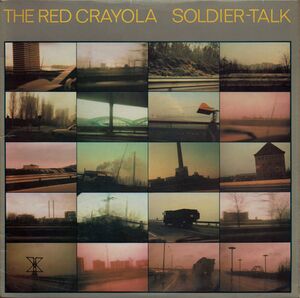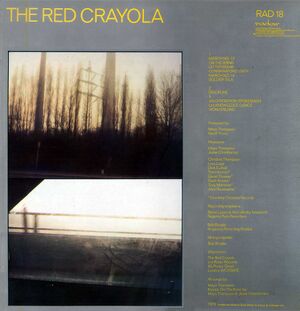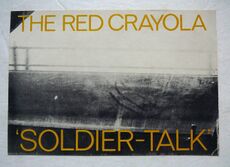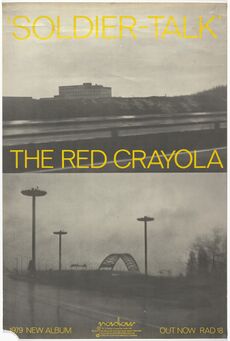Soldier-Talk
| Soldier-Talk | |
|---|---|
 | |
 | |
| Studio album by The Red Crayola | |
| Released | March 1979 |
| Recorded | |
| Studio |
|
| Label | Radar |
Track list
| No. | Title | Length |
|---|---|---|
| 1. | "March No. 12" | 2:01 |
| 2. | "On the Brink" | 2:55 |
| 3. | "Letter-Bomb" | 2:03 |
| 4. | "Conspirators' Oath" | 2:41 |
| 5. | "March No. 14" | 1:22 |
| 6. | "Soldier-Talk" | 7:06 |
| No. | Title | Length |
|---|---|---|
| 1. | "Discipline" | 3:25 |
| 2. | "X" | 3:13 |
| 3. | "An Opposition Spokesman" | 5:02 |
| 4. | "Uh, Knowledge Dance" | 2:57 |
| 5. | "Wonderland" | 3:00 |
Background


- 1978 - Radar reissues
- October 1978 - Howdy from Texas the Lone Star State
- October 1978 - Hurricane Fighter Plane flexidisc
- October1978 - Wives in Orbit (single)
- March 1979 - Soldier-Talk released
- Soldier-Talk tour
Personnel
The Red Crayola
- Mayo Thompson - vocals, guitar
- Jesse Chamberlain - drums
Additional musicians
- Lora Logic - saxophone
- Christine Kozlov - additional vocals
- Dick Cuthell - trumpet
Pere Ubu
- Tony Maimone - bass
- Allen Ravenstine - synthesizer
- David Thomas - additional vocals
- Tom Herman - guitar
- Scott Krauss - drums
Retrospectives
Mayo Thompson, 1986[1]
Jesse [Chamberlain] – there wasn't much for him to do, in a way, I think he wanted to say what he felt about the record, and he wanted it closer in the direction of pop, because Jesse, that's always been one of his gifts, and I was determined to make the record work, and thought that it could, and should, and working with Geoff Travis, using his insights into the way music works, there was no other way it could be… because those songs, they're all very schematic, not all of them, but... they don't have choruses all the way, maybe a motif is repeated but it's not repeated in exactly the same way... it's changed in terms of the time signatures, it's a complicated work.
Mayo Thompson, 2015[2]
[...] Jesse Chamberlain, who drummed and sang some on Corrected Slogans, joined me when Radar gave us a deal. I reformed the band because Christine [Kozlov] and I fell out with Art & Language. I had to get something going, so got back in the music business. Radar was rereleasing the International Artists’ stuff, so it was a natural for all concerned. It made sense to restart the group rather than pursue a solo music career.
[...] Punk qua form wasn’t about making interesting music, rather about music as self-realization. Even poor punk was interesting, though, particularly if it sold. That’s what made the Crayola viable. Sales made it interesting in a broader sense. [...]
Reviews
Melody Maker
April 28, 1979[3]
Jon Savage
Slash
August 1979[4]
Scaruffi
Piero Scaruffi[5]
Pitchfork
April 2, 2007[6]
Douglas Wolk
Dusted
April 10, 2007[7]
Jon Dale
AllMusic
Thom Jurek
Coffee-Table Notes
March 16, 2019[9]
Neil Cooper
References
- ↑ https://www.furious.com/perfect/redcrayola.html
- ↑ https://bombmagazine.org/articles/mayo-thompson/
- ↑ https://www.rocksbackpages.com/Library/Article/red-crayola-isoldier-talki-radar
- ↑ https://archive.org/details/slash_circulation_zero/page/n668/mode/1up
- ↑ https://web.archive.org/web/20020102084435/https://www.scaruffi.com/vol2/redcrayo.html
- ↑ https://pitchfork.com/reviews/albums/9938-soldier-talk/
- ↑ http://www.dustedmagazine.com/reviews/3503
- ↑ https://www.allmusic.com/album/soldier-talk-mw0000577583
- ↑ https://coffeetablenotes.blogspot.com/2019/03/missing-in-action-40-years-of-soldier.html